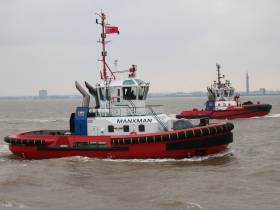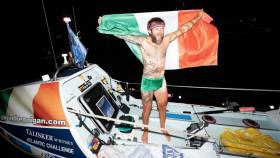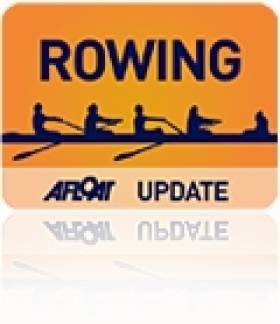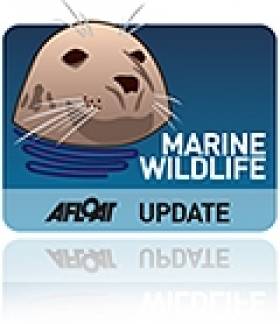Displaying items by tag: Irishman
#ports&shipping - A towage firm in the UK which includes operations in Belfast, has expanded its fleet with a new tug making a recent arrival onto the Humber estuary that leads to the North Sea, writes Jehan Ashmore.
The new tug Manxman operated by SMS Towage of Hessle, north Yorkshire, now brings the Humber based fleet up to 10 vessels and this represents around £5 million worth of investment.
According to SMS, the Azimuth Stern Drive (ASD) 2411 tug is capable of 4200 BKW and sports a bollard pull of 72 tonnes. A brake horsepower of 5,600 is achieved and the tug offers more power than seven Ferraris.
The arrival of the Damen built tug in the Netherlands has been welcomed by the Associated British Port group. Among its portfolio, ABP operates the ports of Goole, Grimsby, Hull and Immingham. These ports are located on both sides of the estuary which is formed by the confluence of the tidal rivers Ouse and Trent.
As reported last year, Afloat saw the former Belfast based Irishman operate out of the Port of Hull. On that occasion the 40 tonnes bollard pull tug was assisting cruiseship Marco Polo through a dock lock prior to setting a course bound for Harwich in Essex.
In addition to operations at the North Sea port and in Northern Ireland, SMS also have tugs located in south-east Wales and in Portsmouth, England.
Hennigan Wins Battle And Takes Third in Atlantic Rowing Race
#Rowing: Gavan Hennigan traversed the finish line in the Talisker Whisky Atlantic Challenge tonight and marked himself out as a record breaker. The 35-year-old Galway man took 49 days to complete the row from La Gomera in the Canaries to Antigua in the West Indies. He became the fastest Irishman to row across the Atlantic, less than half the time taken by Sean McGowan (118 days) on this route in 2010; he also beat the record set by Irish-born Briton Tom McClean, who rowed across the North Atlantic in 55 days in 1987.
Hennigan (35) won an exciting battle with the three-man American Oarsmen to take third of the 12 boats in the race. The American crew pushed hard over the final week and almost caught the Irishman. Though they covered impressive distances each day, Hennigan matched and even outpaced them.
The crew which won, Latitude 35, set a new world record. It had a four-man crew, as did the second boat to finish, Row for James.
Taking their places behind Hennigan are a four, three trios, two pairs and three solos.
Hennigan is not the fastest man to row solo across the Atlantic, as stated in one media outlet. In 2013, Charlie Pitcher became the fastest solo rower to cross the Atlantic in an open class boat: he crossed from La Gomera to Barbados in 35 days and 33 minutes. The statistics are available on oceanrowing.com.
What a wonderful achievement by Gavan Hennigan. When he said he thought he could complete the race in 50 days, I thought it was hugely ambitious for a first-timer. And then he beat it! Amazing.
You might be able to confirm something for me. Is he now the fastest solo rower over the La Gomera to Antigua course? And do you know where he ranks in the list of solo rowers to cross the Atlantic?
He told me you were a key part of the team he had ‘on land’. Well done to all!
Yours,
Liam Gorman, Rowing Correspondent, The Irish Times
00353 (0)86 8051830
Irishman Prepares For Pacific Rowing Race
#OceanRowing: Irishman Philip Cavanagh is set to compete in the Great Pacific rowing race from Monterey in California to Honolulu in Hawaii next summer. Cavanagh is putting together a four-person team, which will be called Battleborn. Barry Hayes from Wales and Englishman Howard Wagstaff are already signed up. None of the three had been rowers prior to committing to this project.
The race, which the organisers hope to run every two years, covers approximately 2,100 nautical miles (2,400 miles; 3,890 kilometres) and there will be trophies for the fastest four, pair and single to complete the journey. Nineteen crews (seven fours, six singles and six pairs) intend to compete.
Search Called Off for Irishman Swept into Sea in Maine
The US Coast Guard has called off the search for an Irishman who was swept out to sea in Maine last Friday.
The Irish Independent named the man as Thomas Clarke, originally from Kilnaleck in Co Cavan.
The 32-year-old was reportedly knocked into the water on Friday afternoon by a huge wave near Monhegan Island, 12 miles off the Maine coast.
He was apparently attemping to take pictures of the waves swollen by the passing Hurricane Katia when he was struck and pulled out in a riptide.
Four friends tried to rescue him to no avail, with one needing to be rescued from rocks by helicopter.
According to WABI TV, rescue crews spent nearly two days scouring 600 miles of coastline before calling off the search on Saturday night.
Clarke had been in the area with friends sightseeing before a wedding. A long time resident of the US, he had returned more than a year ago after several years in Ireland.
The Irish Independent has more on the story HERE.
Dolphins Watched Over Drowned Irishman
A pod of dolphins attempted to save the life of an Irishman who drowned in Australia last month after only six weeks in the country.
Irish Central reports that Shaun McBride from Donegal was dismantling scaffolding at a wharf in Dampier, Western Australia, when the structure collapsed into the water.
Police divers reportedly found his body surrounded by a pod of dolphins. One of them was using its nose to push the body to the surface.
Shaun's mother Sylvia told mourners at his funeral in Burtonport that she had been comforted at learning the dolphin's actions in keeping vigil on her son.
Irish Central has more on the story HERE.


































































